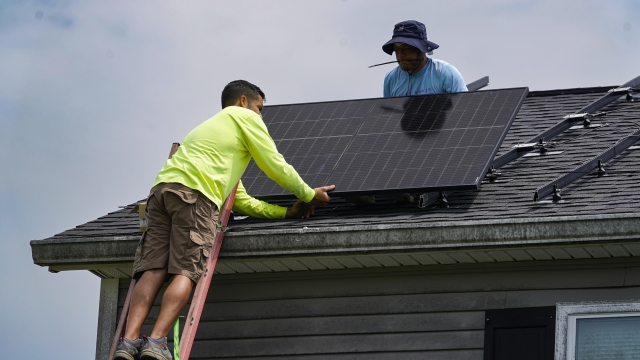A giant solar farm was finished just last year, producing enough power for thousands of homes. Some might be surprised to learn it's in Texas — just outside Houston in Fort Bend County, where people associate energy more with fossil fuels and less with solar.
Nonetheless, a new report shows Texas led the country in new solar capacity in 2023 — the second time in three years.
Texas isn't just oil-rich, but also blessed with sunshine.
"The first, the most obvious one being Texas. It is a great source of sunlight. We know that the market conditions here are ripe for all types of clean energy that are driving the prices down for consumers," said Matthew Boms, executive director of the Texas Advanced Energy Business Alliance.
Depending what part of Texas you're in, you may get more than 300 sunny days a year, prime conditions for solar panels to soak in the energy. Plus there's a lot of open land to build solar farms.
A recent industry report found that across the country, the U.S. solar industry added a record 32.4 gigawatts of new electric generating capacity in 2023. That's a 37% increase from the previous record set in 2021, and a 51% jump from 2022.
The report says that by 2034, total U.S. solar capacity is expected to grow enough to power more than 100 million homes.
"It's the wide open spaces. There's plenty of land that can be converted to useful solar farms. Second, solar is a lot less expensive to install than wind," said Ed Hirs, energy fellow at the University of Houston.
The Solar Energy Industries Association credits the Federal Inflation Reduction Act for supercharging the industry through incentives such as tax credits — although Hirs says in Texas the market incentives for solar investment were already high.
"They don't ever commit electricity in the day ahead market because, well they're weather dependent. But they benefit if the price goes to $5,000 a megawatt hour, like it did multiple times over the summer, the wind and solar guys get that uplift," said Hirs.
Of the top 10 states adding more solar energy, Colorado and Ohio returned to the list for the first time in a decade and Wisconsin made its first appearance ever. However, the industry sees some challenges.
"Politically speaking, we have to make sure that the political climate doesn't interrupt the market that's in place, for clean energy, like large-scale solar, wind and battery storage," said Boms.
The report cites concerns about the upcoming presidential election, which pits an alternative energy-friendly President Joe Biden against Donald Trump, who has disparaged solar and wind power as unreliable.
SEE MORE: Are solar panels worth installing at your home?
Trending stories at Scrippsnews.com



